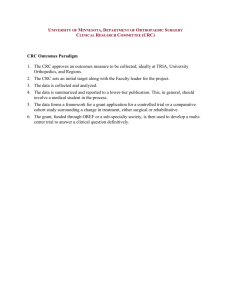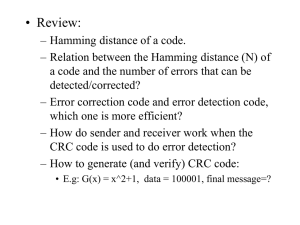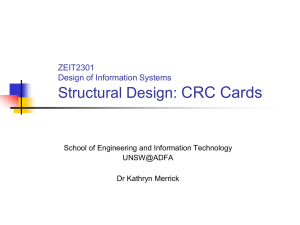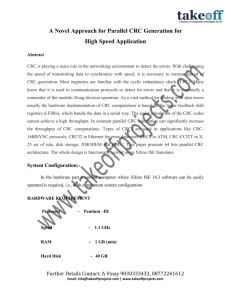2014 Global Symposium for Regulators
advertisement
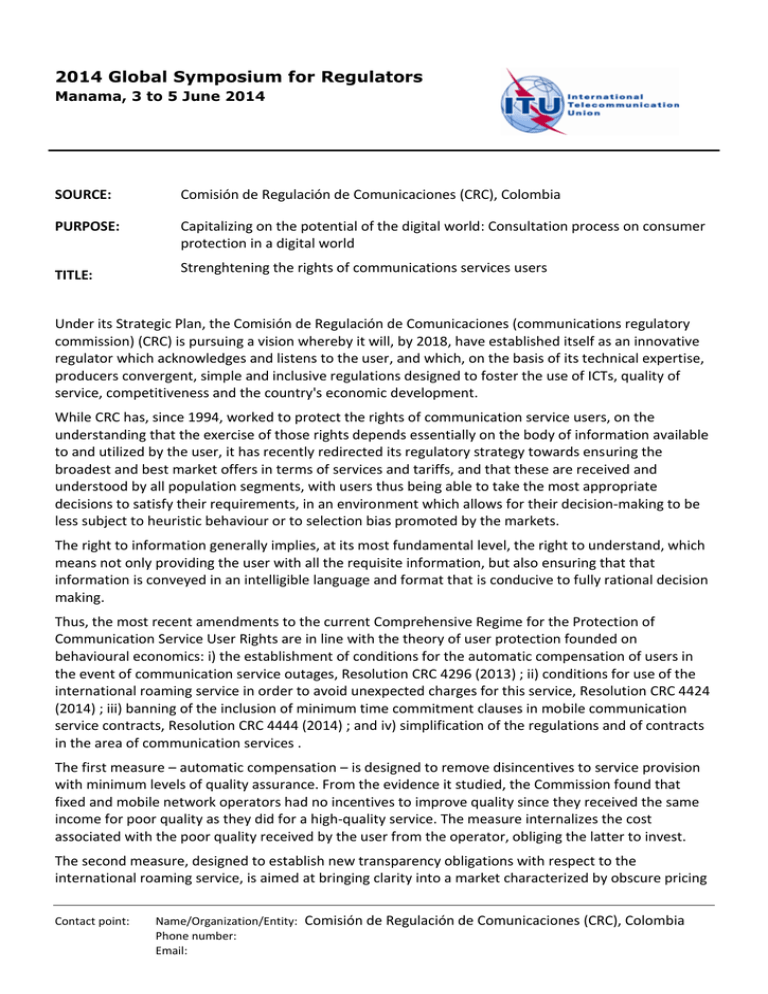
2014 Global Symposium for Regulators Manama, 3 to 5 June 2014 SOURCE: Comisión de Regulación de Comunicaciones (CRC), Colombia PURPOSE: Capitalizing on the potential of the digital world: Consultation process on consumer protection in a digital world TITLE: Strenghtening the rights of communications services users Under its Strategic Plan, the Comisión de Regulación de Comunicaciones (communications regulatory commission) (CRC) is pursuing a vision whereby it will, by 2018, have established itself as an innovative regulator which acknowledges and listens to the user, and which, on the basis of its technical expertise, producers convergent, simple and inclusive regulations designed to foster the use of ICTs, quality of service, competitiveness and the country's economic development. While CRC has, since 1994, worked to protect the rights of communication service users, on the understanding that the exercise of those rights depends essentially on the body of information available to and utilized by the user, it has recently redirected its regulatory strategy towards ensuring the broadest and best market offers in terms of services and tariffs, and that these are received and understood by all population segments, with users thus being able to take the most appropriate decisions to satisfy their requirements, in an environment which allows for their decision-making to be less subject to heuristic behaviour or to selection bias promoted by the markets. The right to information generally implies, at its most fundamental level, the right to understand, which means not only providing the user with all the requisite information, but also ensuring that that information is conveyed in an intelligible language and format that is conducive to fully rational decision making. Thus, the most recent amendments to the current Comprehensive Regime for the Protection of Communication Service User Rights are in line with the theory of user protection founded on behavioural economics: i) the establishment of conditions for the automatic compensation of users in the event of communication service outages, Resolution CRC 4296 (2013) ; ii) conditions for use of the international roaming service in order to avoid unexpected charges for this service, Resolution CRC 4424 (2014) ; iii) banning of the inclusion of minimum time commitment clauses in mobile communication service contracts, Resolution CRC 4444 (2014) ; and iv) simplification of the regulations and of contracts in the area of communication services . The first measure – automatic compensation – is designed to remove disincentives to service provision with minimum levels of quality assurance. From the evidence it studied, the Commission found that fixed and mobile network operators had no incentives to improve quality since they received the same income for poor quality as they did for a high-quality service. The measure internalizes the cost associated with the poor quality received by the user from the operator, obliging the latter to invest. The second measure, designed to establish new transparency obligations with respect to the international roaming service, is aimed at bringing clarity into a market characterized by obscure pricing Contact point: Name/Organization/Entity: Phone number: Email: Comisión de Regulación de Comunicaciones (CRC), Colombia 2 and multiple invoicing issues that undermine the user's interests. The resulting price transparency is intended to avoid the phenomenon of "bill shock" by obliging operators to provide tariff plans that enable users of voice and data services to monitor their expenditure, including the total to date. With users being thus duly informed, the operator will be less inclined to obscure its prices. The third measure – banning of the inclusion of minimum time commitment clauses in mobile communication service contracts – is designed on the one hand to inject greater dynamism into the communication service and mobile terminal markets, putting an end to the spread of bundled packages and eliminating the position of joint dominance which enables operators, with a market share exceeding 90 per cent, to determine the purchase prices paid to the manufacturer, affecting the types of terminal it imports into the country, and the selling price to the user, for whom the options are limited to whatever the operator chooses to import. On the other hand, the measure seeks to afford greater freedom to the user, who is able to change terminal without being bound by lengthy user commitment periods. The fourth measure – regulatory and contractual simplification – stems from the exhaustive review undertaken by CRC in 2013 of the content and form of the contracts for mobile telephony service provision currently in force between providers and users, to take account of the fact that communication services are public services which must be accessible to the entire population without distinction as to social stratum or region. This necessitates the establishment of clear, simple and specific contracts without small print, resulting in empowered users aware of the conditions of service to which they are signing up. Based on the above-mentioned studies and on the more bottom-up approach that underpins behavioural economics, the way is now open for studying the behaviour of individuals and their environment, allowing for a better approximation of their economic behaviour. Following this same reasoning, CRC is currently in the process of reformulating the regulatory provisions to ensure that the information provided to the user and the regulations themselves constitute a more effective, simple, clear and transparent tool that is conducive to social well-being. Along the same lines, the Commission is assessing the appropriateness of including within the User Protection Regime measures intended to lend greater flexibility to its procedures, generate incentives and open up the possibility of users automatically exercising their rights. It is also looking into the possibility of including within the Regime alternative dispute resolution mechanisms, including selfresolution. In this way, given the need for changes to re establish a balance in the user-operator relationship, and with the aim of facilitating the genuine exercise of user rights, CRC has been engaged in studies with a view to modifying the structure and content of the Comprehensive Regime for the Protection of Communication Service User Rights, establishing a convergent regime which addresses the characteristics and requirements of the telephony, internet, television and postal services markets on the basis of criteria of simplicity and clarity in the interests of proper understanding and action on the part of users and operators, thereby generating transparency in service provision, freedom of choice for the user, the genuine exercise of user rights and, ultimately, harmonization with the regulations in force. It is also to be noted that CRC is reviewing the current conditions for access to national and international long-distance communications, with a view to ensuring that users, especially prepaid mobile telephony service users, are able to choose their long-distance service provider, and that providers all enjoy the same dialling conditions for access to their services. The definition of technical, legal and economic conditions for the implementation of dialling parity for the selection of long-distance calls is intended to 3 guarantee the rights of fixed and mobile telephony service users to access any of the long-distance service providers under the same conditions. As part of the strengthening of transparency measures in favour of the user, CRC is developing a web portal through which users will be able to access basic information on procedures in respect of requests, complaints or appeals, theft, type approval of user terminals, user rights, regulatory projects and quality of service, as well as web applications for comparing tariffs and submitting requests, complaints or appeals to operators. Finally, in the interests of determining the opinion of users with respect to their relationship and interaction with telephony, internet and television service providers, telephone surveys are being carried out to gauge user perception of the quality of service provision in the areas of mobile and fixed telephony, mobile and fixed internet and subscription television. Information is being gathered in 16 Colombian cities in order to gain a representative nationwide sample of user opinion. All of these efforts are underpinned by criteria of simplicity and rights of the user, with whom all communication is in plain language in the interests of proper understanding and action on the part of users and operators alike. This will translate into a strengthening of free choice for users and the genuine exercise of their rights, which in turn is bound to result in enhanced well-being for society in general and users in particular. ______________
